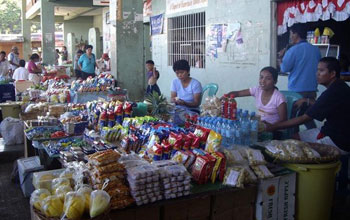All Images
News Release 11-118
Can Small Loans Reduce Poverty?
Yale University economist says microfinance yields surprising results
This material is available primarily for archival purposes. Telephone numbers or other contact information may be out of date; please see current contact information at media contacts.

Vendors like these in this market in the Philippines can apply for and receive small loans of $100 to $500 dollars. This microcredit is designed to help extremely poor people engage in successful entrepreneurship and improve their quality of life. But new research says microcredit works in ways proponents don't expect.
Credit: Innovations for Poverty Action
Download the high-resolution JPG version of the image. (68 KB)
Use your mouse to right-click (Mac users may need to Ctrl-click) the link above and choose the option that will save the file or target to your computer.

Traditional microlenders target women who operate small-scale businesses and use group lending mechanisms. But the expansion of microlending means it often ends up looking more like traditional retail or small business lending that has the same impact on women and men.
Credit: Innovations for Poverty Action
Download the high-resolution JPG version of the image. (71 KB)
Use your mouse to right-click (Mac users may need to Ctrl-click) the link above and choose the option that will save the file or target to your computer.

The researchers' work is described in the June 10, 2011 issue of the journal Science.
Credit: Copyright AAAS 2011
Download the high-resolution JPG version of the image. (1.2 MB)
Use your mouse to right-click (Mac users may need to Ctrl-click) the link above and choose the option that will save the file or target to your computer.
